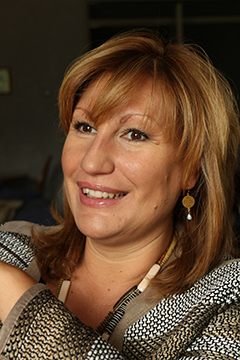Achieve gender equality and empower all women and girls. -- Sustainable Development Goal (SDG) 5
[8 August 2017] -- A member of Cities Alliance, United Cities and Local Governments (UCLG) is involved in Joint Work Programmes (JWPs) on Gender Equality and the implementation of the New Urban Agenda and the Agenda 2030. Emilia Saiz, Deputy Secretary General of UCLG, recently participated in the United Nations High-Level Political Forum on Sustainable Development representing the perspective of local governments. She offers her views on why supporting cities is an essential part of global commitments to empower women. This article is the first in a series highlighting gender equality and development.
How does UCLG promote gender issues and SDG 5 through its work?
The United Cities and Local Governments organisation seeks to support the participation of women in local decision-making and ultimately promote women’s leadership. Some of the ways UCLG does this include through the creation of women-elected caucuses, facilitating mentoring of women, and engaging with civil society and women’s groups to promote gender-responsive policies in cities.
UCLG is particularly concerned with the fulfilment of Sustainable Development Goal (SDG) 5.5.1 – increasing the proportion of seats held by women in local governments. At present, there are very few women serving in a councillor capacity around the world– only 13 per cent. UCLG recognises that there is an urgent need to generate more opportunities for women in decision making. Ensuring better representation of women in local government is an important step towards more gender-sensitive policies.
UCLG also aims to facilitate spaces for the discussion of different policies and their impact on women, especially by convening female elected officials. One of UCLG’s focus areas is to facilitate national and regional discussions on these issues.
What is the role of local communities in the achievement of SDG 5?
To address the social and economic challenges faced in cities today, behaviour change needs to be promoted at the local level. There needs to be a change in attitudes at a community level, by, for instance, educating boys around harmful social norms, and to build women’s awareness of their rights (economic, land ownership).
Local realities and local practices are the key to global transformation. It is not possible to discuss SD5 without reflecting on the role of local government in relation to the other SDGs. In an urbanised world, we need to get cities right if we want to get global development right. Cities are the pillars of the global economy, and so must drive equality if we want to see global change. It is vital to ensure that local governments, as the closest level of government to communities, make women’s empowerment and gender equality a key priority. By doing so, we are helping to ensure urban policies contribute to the fulfilment of SDG 5.
What are the key achievements and challenges related to SDG 5 as debated at the High-Level Political Forum 2017 in New York?
One of the main challenges in achieving SDG5 is the lack of awareness among key influencers about the important role local government plays in general development policies.
As part of the SDG Review, there are approximately 50 countries contributing with national data, representing about 400,000 local governments in these countries alone. If we could get these local governments to support the SDGs, it would be very powerful. They represent 5.2 billion people!
Many discussions around the SDGs are operating in silos. One prime example is SDG 11 – which operates as an SDG but one cannot forget that other SDGs must be attained in cities as well. One cannot think about SDG 11 (cities) separately from the others. There is an urgent need for new thinking. It is instrumental to involve local authorities in the monitoring of the SDGs, and ensure that regular reporting mechanisms exist at the local level. This ‘localisation of the SDG agenda’ is something UCLG is actively lobbying for, in the framework of the Cities Alliance. As a member of the Cities Alliance, UCLG is promoting the engagement of the sub-national spheres of government in the monitoring of the SDGs.
As co-chair of the Joint Work Programme for Gender Equality, I have been working with Cities Alliance to ensure that more gender-responsive programming is incorporated into the organisation. The feminisation of policies is extremely important in the promotion of women’s access to local decision making.
UCLG has been part of the Cities Alliance JWP for the SDGs and the New Urban Agenda, which focuses on the implementation of the Global Agendas relevant for cities. For relevant information on the NUA-SDG Joint Work Programme, please contact Alexandra Kurth (mkurth@citiesalliance.org). For information on the Gender Joint Work Programme, please contact Laura Lima (llima@citiesalliance.org).

It is vital to ensure that local governments, as the closest level of government to communities, make women’s empowerment and gender equality a key priority." -- Emilia Saiz
Related Items:




